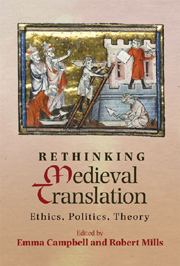Book contents
- Frontmatter
- Contents
- List of Illustrations
- List of Contributors
- Acknowledgements
- Introduction: Rethinking Medieval Translation
- 1 On Not Knowing Greek: Leonzio Pilatus's Rendition of the Iliad and the Translatio of Mediterranean Identities
- 2 Translation and Transformation in the Ovide moralisé
- 3 Translating Lucretia: Word, Image and ‘Ethical Non-Indifference’ in Simon de Hesdin's Translation of Valerius Maximus's Facta et dicta memorabilia
- 4 Translating Catharsis: Aristotle and Averroës, the Scholastics and the Basochiens
- 5 The Ethics of Translatio in Rutebeuf's Miracle de Théophile
- 6 Invisible Translation, Language Difference and the Scandal of Becket's Mother
- 7 Medieval Fixers: Politics of Interpreting in Western Historiography
- 8 The Task of the Dérimeur: Benjamin and Translation into Prose in Fifteenth-Century French Literature
- 9 The Translator as Interpretant: Passing in/on the Work of Ramon Llull
- 10 Rough Translation: Charles d'Orléans, Lydgate and Hoccleve
- 11 Bueve d'Hantone/Bovo d'Antona: Exile, Translation and the History of the Chanson de geste
- Untranslatable: A Response
- Bibliography
- Index
Introduction: Rethinking Medieval Translation
Published online by Cambridge University Press: 05 April 2013
- Frontmatter
- Contents
- List of Illustrations
- List of Contributors
- Acknowledgements
- Introduction: Rethinking Medieval Translation
- 1 On Not Knowing Greek: Leonzio Pilatus's Rendition of the Iliad and the Translatio of Mediterranean Identities
- 2 Translation and Transformation in the Ovide moralisé
- 3 Translating Lucretia: Word, Image and ‘Ethical Non-Indifference’ in Simon de Hesdin's Translation of Valerius Maximus's Facta et dicta memorabilia
- 4 Translating Catharsis: Aristotle and Averroës, the Scholastics and the Basochiens
- 5 The Ethics of Translatio in Rutebeuf's Miracle de Théophile
- 6 Invisible Translation, Language Difference and the Scandal of Becket's Mother
- 7 Medieval Fixers: Politics of Interpreting in Western Historiography
- 8 The Task of the Dérimeur: Benjamin and Translation into Prose in Fifteenth-Century French Literature
- 9 The Translator as Interpretant: Passing in/on the Work of Ramon Llull
- 10 Rough Translation: Charles d'Orléans, Lydgate and Hoccleve
- 11 Bueve d'Hantone/Bovo d'Antona: Exile, Translation and the History of the Chanson de geste
- Untranslatable: A Response
- Bibliography
- Index
Summary
Why might medieval translation need rethinking? Why ethics, why politics? In one sense, after all, medievalists are arguably ahead of the game when it comes to exploring the political and ethical dimensions of translation. The Latin concept of translatio, which assumed from at least the ninth century an explicit cultural meaning through its association with the model of translatio studii et imperii, has long been linked with ideas of translation as an ideological as well as a more narrowly linguistic or textual phenomenon. French monarchs, following the death of Charlemagne, sought to assert claims to cultural and political superiority by proving their credentials as the inheritors of imperium (power or legitimacy) from Rome and of studium (knowledge or learning) from ancient Greece and Rome. Just as political power had transferred first from Greece to the Roman Empire, and then in turn to the Holy Roman Empire under Charlemagne, so now it was France which, according to this logic, inherited the supreme power of its imperial forebears; vernacular translations of classical texts likewise affirmed their ability to appropriate the power and cultural prestige of the ancients. Similarly, the translatio imperii topos was used to justify royal legitimacy in Norman England: the myth of Brutus, ‘first’ king of Britain and descendant of Rome's Trojan founder Aeneas, secured for Anglo-Norman monarchs a line of descent that also extended back to ancient Greece and Rome.
- Type
- Chapter
- Information
- Rethinking Medieval TranslationEthics, Politics, Theory, pp. 1 - 20Publisher: Boydell & BrewerPrint publication year: 2012



